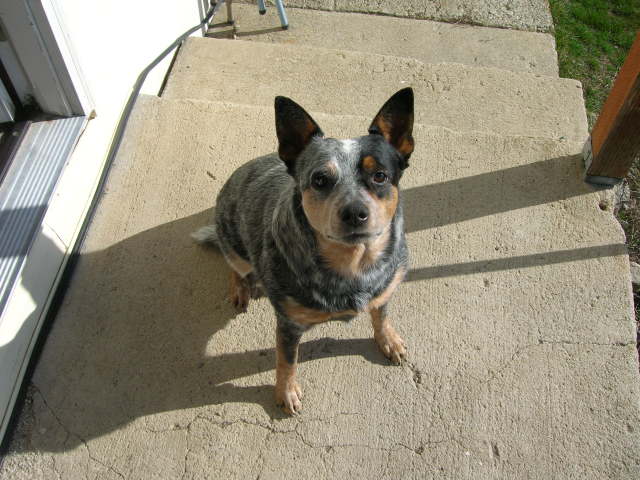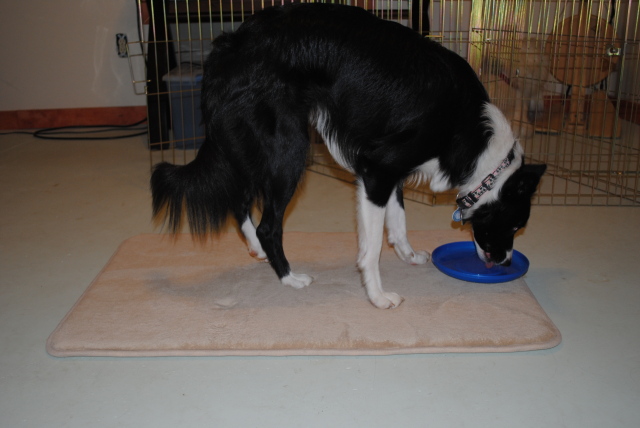QuestionDear Barb:
We adopted an 11 pound Cairn Terrier mix from a shelter to be a companion to another similar dog about 8-9 months ago. She is about 2-3 years old and has lived in shelters most of her life. We take her out for long walks every morning and every night and on weekends, very frequently throughout the day. We have a doggie door in the kitchen that leads to a small fenced in backyard. She does know how to use the doggie door, as she goes in and out frequently. She poops and pees outside regularly when we walk. I provide treats and praise when she does this outside.
When we first got her, she would pee and poo on all the rugs in our house, probably about once a week. We had them cleaned but rolled them up and put them away so they wouldn't get completely ruined. She has peed and pooped on the floor maybe 5 times, and since we can clean it up, it has been annoying but manageable. Once she both peed and pooped on our bed, where she sleeps too. And she has pooped on our leather couch as well, at least 3 or 4 times, sometimes while we're out, sometimes while we're home. Last night she peed on the leather couch during the night, while we slept. A: why couldn't she have gone outside via the doggie door, and B: if not that, why not on the floor where I could just wipe it up? She has now caused permanent damage to an expensive piece of furniture and my husband is furious.
I took her to the vet to check for an infection (negative) and went and bought a baby gate and a crate. We decided we can't trust her in the house unsupervised and will keep her in the kitchen with the doggie door and at night in the crate. We also decided that she should not be allowed on the furniture any more, so we've been saying "off" and shooing her off of the couch when she jumps up. (she went in the crate very easily and slept in it with no problems.) I bought a spray that is supposed to contain enzymes they don't like so it is supposed to deter them from evacuation on furniture. I hope it works!
But it's very difficult to live this way! I hate it! Our other dog is perfect, with never any problems! We will keep both dogs in the kitchen during the day so they have each other for company. What else do we need to do?
AnswerHi Catherine. You certainly have a challenging situation. Dogs that live in shelter or puppy mill situations sometimes have a hard time with housetraining once they find a home. They've spent so long "going" wherever they are at the time that it becomes habit, and long-standing habits are hard to break.
She needs to be crated at all times when you can't directly supervise her. Go back to Puppy Housetraining 101 - if you can't see her, assume she's off peeing or pooping somewhere. If you want to allow her freedom, you can leash and tether her to your belt so she goes where you go.
You can manage and possibly reduce bowel movements by maintaining a strict feeding schedule - no free feeding. Feed twice a day and pick whatever is not eaten after 15 minutes. Be sure your dog food has no corn and no by-products. Keep a log of her elimination activities for a week so that you can begin to predict how long after a meal that she'll have to go.
You're doing the right things by keeping her off furniture and restricting her freedom by keeping her in the kitchen when you go out. Because of her lengthy history of shelter life, it may take quite a while to retrain her to use the yard as her only bathroom. Stay vigilant with management, clean up with the enzymatic cleaner, and don't allow her access to the places where she's eliminated previously. After you've gone a couple of months without any accidents, you can begin to allow her a bit more freedom in the house. Don't rush this - any accidents are going to set you back even further.
I do wonder why she was in the shelter for so long. Does she have other behavioral issues that kept her there? Is she a nervous or fearful dog? Sometimes stress can contribute to soiling in the home - especially when the target is a human's bed. If she is fearful, it will be good to address those issues as well.
Please let me know if you have any questions or follow up comments. It sounds like you're on the right track now. Good luck!

 scratching carpet
QuestionQUESTION: Why has our 4 year-old female red hee
scratching carpet
QuestionQUESTION: Why has our 4 year-old female red hee
 Dog tackling
Question
My dog
I would like to know a technique or a t
Dog tackling
Question
My dog
I would like to know a technique or a t
 White German Shepherd Aggression
Question
Chloe
A little background on my dog Chl
White German Shepherd Aggression
Question
Chloe
A little background on my dog Chl
 traumatic
QuestionI have a 6 lb Yorkie that is a rescue, weve had
traumatic
QuestionI have a 6 lb Yorkie that is a rescue, weve had
 Peeing on edge of training pad
QuestionI have a 3 year old Poodle who has been house t
Peeing on edge of training pad
QuestionI have a 3 year old Poodle who has been house t